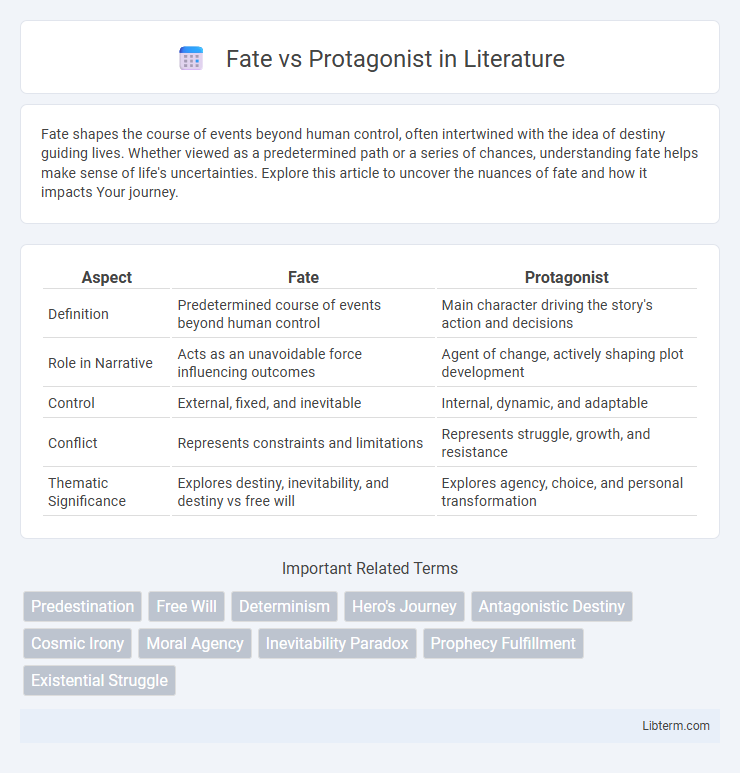Fate shapes the course of events beyond human control, often intertwined with the idea of destiny guiding lives. Whether viewed as a predetermined path or a series of chances, understanding fate helps make sense of life's uncertainties. Explore this article to uncover the nuances of fate and how it impacts Your journey.
Table of Comparison
| Aspect | Fate | Protagonist |
|---|---|---|
| Definition | Predetermined course of events beyond human control | Main character driving the story's action and decisions |
| Role in Narrative | Acts as an unavoidable force influencing outcomes | Agent of change, actively shaping plot development |
| Control | External, fixed, and inevitable | Internal, dynamic, and adaptable |
| Conflict | Represents constraints and limitations | Represents struggle, growth, and resistance |
| Thematic Significance | Explores destiny, inevitability, and destiny vs free will | Explores agency, choice, and personal transformation |
Understanding the Concept of Fate
Fate represents an inevitable force shaping the protagonist's journey, often beyond their control or anticipation. Exploring the dynamic between fate and free will reveals deeper narrative tension as characters wrestle with predestined outcomes versus personal choice. Understanding fate as a thematic element enriches character development and highlights existential questions central to many literary and cinematic works.
The Role of the Protagonist in Literature
The protagonist in literature serves as the central character around whom the narrative revolves, embodying human desires, conflicts, and growth. Their struggle against fate highlights the tension between free will and destiny, often driving the plot's emotional and thematic depth. Literary examples such as Oedipus in Greek tragedy and Shakespeare's Hamlet demonstrate how protagonists confront predetermined outcomes, shaping the reader's understanding of agency and inevitability.
Fate as a Driving Force in Storytelling
Fate serves as a crucial driving force in storytelling by shaping the protagonist's journey through preordained challenges and inevitable outcomes. This dynamic creates tension and depth, compelling the protagonist to confront internal and external conflicts that test their resolve and growth. The interplay between fate and free will often defines the narrative arc, highlighting themes of destiny, choice, and transformation.
Protagonist’s Agency: Free Will or Illusion?
The protagonist's agency in Fate vs Protagonist conflicts often blurs the line between free will and illusion, raising questions about autonomy within predestined narratives. Evidence within classic and contemporary literature showcases characters grappling with choices that seem influenced or predetermined by external forces. This tension highlights the psychological struggle between accepting destiny and asserting individual control over one's path.
Iconic Examples of Fate vs Protagonist
In literature and film, iconic examples of fate versus protagonist conflict include Sophocles' "Oedipus Rex," where Oedipus relentlessly struggles against a prophecy that foretells his downfall. Shakespeare's "Macbeth" showcases a protagonist grappling with his destiny after encountering the witches' prophecies, which spurs his ambition and tragic decline. Another renowned example is in Homer's "Odyssey," where Odysseus continuously challenges the gods' will and fate on his arduous journey home.
Symbolism and Motifs: Fate’s Influence
Fate in storytelling often symbolizes an irresistible, predestined force that challenges the protagonist's journey, highlighting motifs such as inevitability, prophecy, and the struggle for free will. Motifs like crossroads, omens, and cyclical patterns emphasize the tension between destiny and choice, reinforcing the protagonist's internal conflict and growth. This interplay elevates the narrative by exploring themes of control, surrender, and the meaning of human agency amid seemingly predetermined outcomes.
Conflict and Tension: Defying the Inevitable
The conflict between Fate and the Protagonist intensifies as the latter struggles against predetermined outcomes, creating a dynamic tension that drives the narrative forward. This confrontation challenges the Protagonist's agency, highlighting themes of free will versus destiny while amplifying emotional stakes. Each act of defiance against Fate heightens suspense, underscoring the precarious balance between control and surrender within the story.
Transformation of the Protagonist Through Fate
The protagonist's transformation is deeply shaped by the challenges imposed by fate, which functions as an unyielding force driving growth and self-discovery. Through confronting inevitable trials and overcoming seemingly insurmountable obstacles, the protagonist evolves from vulnerability to resilience, embodying a profound internal change. This dynamic tension between fate and free will underscores the narrative arc, highlighting the protagonist's journey toward empowerment and self-realization.
Fate in Modern Narratives
Fate in modern narratives often serves as an unpredictable force that challenges protagonists, shaping their journeys through unforeseen obstacles and consequences. It is portrayed as a complex and sometimes adversarial power, testing characters' resilience and decision-making under pressure. This dynamic explores themes of free will versus determinism, emphasizing how characters either succumb to or defy their destined paths.
Lessons and Reflections: Fate, Protagonist, and the Reader
Fate challenges the protagonist to confront unforeseen obstacles, teaching resilience and adaptability in the face of uncertainty. The protagonist's responses offer readers insights into courage, self-determination, and the complex interplay between destiny and free will. This dynamic encourages reflection on how much control one truly has over life's path and inspires a deeper understanding of personal growth through struggle.
Fate Infographic

 libterm.com
libterm.com